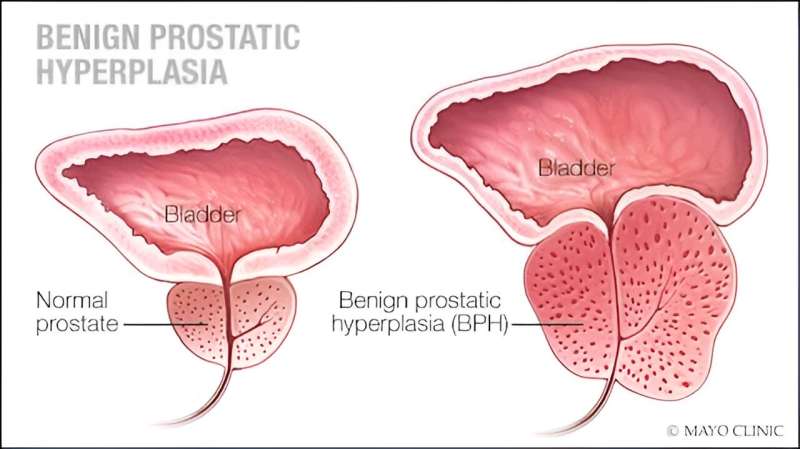This article has been reviewed according to Science X's editorial process and policies. Editors have highlighted the following attributes while ensuring the content's credibility:
fact-checked
trusted source
proofread
Video: What does it mean to have an enlarged prostate?

An enlarged prostate, known as benign prostatic hyperplasia (BPH), is a common condition often associated with the natural aging process in men. Dr. Scott Cheney, a Mayo Clinic urologist, says it's a condition where the prostate enlarges over time and restricts the flow of urine.
"I like to tell patients that the prostate is kind of like an orange with a straw going right through the middle of it. And as we age, the prostate gets larger and larger, and the urethra gets compressed by the tissue of the prostate. This makes it more difficult for the bladder to push urine through the urethra, making it harder to empty the bladder," says Dr. Cheney.
The prostate, situated just below the bladder, surrounds the upper part of the urethra—the tube responsible for draining urine from the bladder. The prostate's primary function is to facilitate the reproductive process and fertilization.
Enlargement of the prostate gland can give rise to uncomfortable urinary symptoms, including the obstruction of urine flow from the bladder, causing individuals to strain more to urinate.
Dr. Cheney says prostate enlargement, or BPH, does not mean cancer. "It is truly just enlargement, and the cells in the prostate are not cancerous. Prostate enlargement is much more common than prostate cancer," he says.
An enlarged prostate can cause troublesome symptoms and affect the quality of a person's life.
"It's a big quality of life issue for men," says Dr. Cheney. "I think a lot of men ignore their symptoms for a long time because we don't like to complain or think it is a normal part of aging. But, in reality, it's so common, and there are multiple ways that we can treat prostate enlargement and symptoms associated with it."
Symptoms of an enlarged prostate include:
- Frequent or urgent need to urinate.
- Urinating more often at night.
- Trouble starting to urinate.
- Weak urine stream, or a stream that stops and starts.
- Dribbling at the end of urination.
- Not being able to empty the bladder fully.
"Treatment can be something as simple as taking a well-tolerated medication that helps to open that channel through the prostate that can relieve symptoms, all the way up to surgery where we remove the obstructing tissue of the prostate to leave men with a more wide-open channel and better emptying," he says.
Treatment options
"Here's how I like to think about treatment of prostate enlargement. The first thing that you can do is lifestyle modifications, which takes no medicine and is low risk. You can tell a man to avoid excess fluids, especially before bed. Some men don't realize how much fluid they're drinking. The more fluid you drink, the more often you're going to have to urinate. The types of fluids also matter," Dr. Cheney says. "If a man is drinking a lot of caffeine, a lot of alcohol, especially before bed, that can cause nighttime issues to be worse. Some simple lifestyle tweaks can help men significantly and improve their symptoms."
"The next step in treatment of BPH is to try medications, and there are several different drug classes that we have to treat BPH. But essentially, they work on maximizing the channel through the prostate. They relax the muscle in the prostate to help open that channel or can shrink the prostate. Typically, those medications are not as effective as surgery, but they're also less invasive and less aggressive," he says.
Many types of surgeries and procedures may help with an enlarged prostate.
"If medications are not working well, we may suggest surgical management of an enlarged prostate. Less invasive surgical options include Rezum, UroLift and iTind. More definitive options would be transurethral resection of the prostate or holmium laser enucleation of the prostate," says Dr. Cheney.
Any prostate procedure may result in side effects. Working with your health care team to determine the best option is essential.
Seek medical help
"It's sad to know that men are suffering out there and don't want to complain. They don't want to bring it up. It's embarrassing to admit that there's a problem there. But there are many wonderful, effective solutions to treat prostate enlargement," says Dr. Cheney.



















